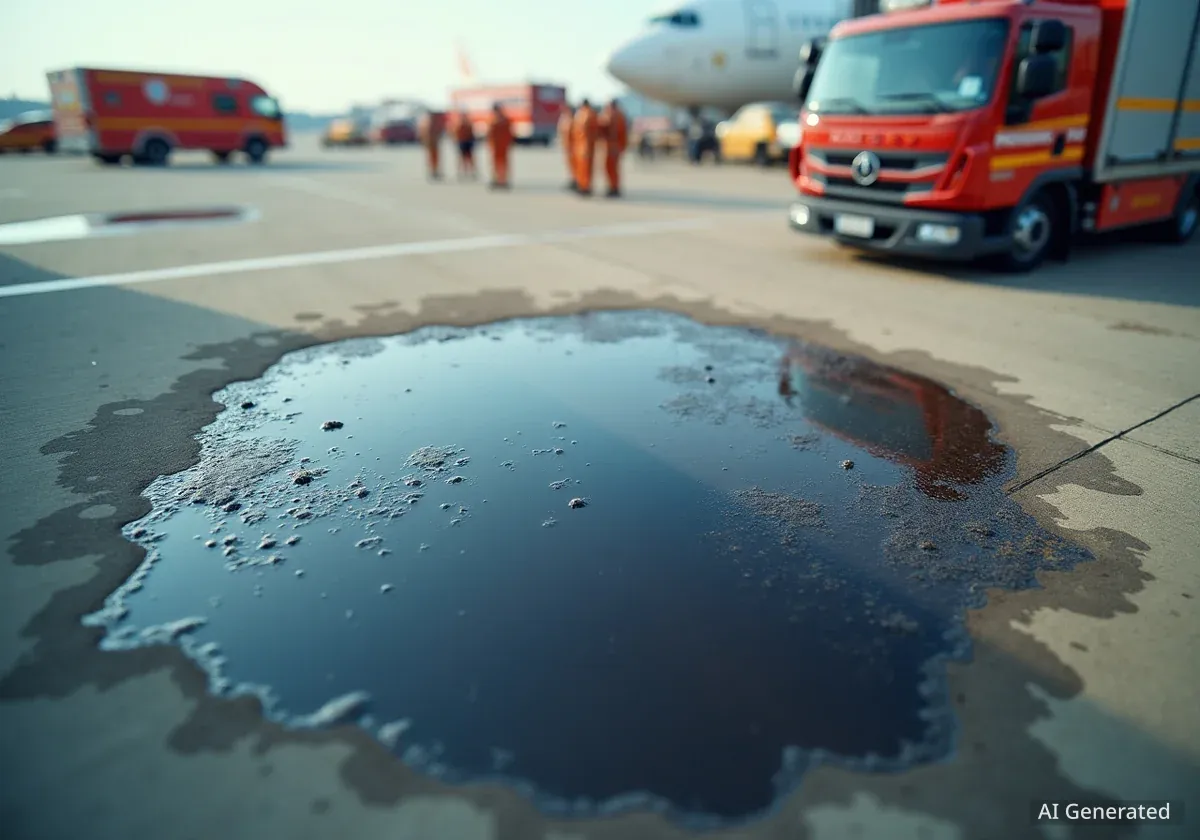A significant jet fuel spill occurred at Dallas-Fort Worth (DFW) International Airport on Saturday, October 11, 2025, during the refueling of an American Eagle regional jet. The incident led to a large volume of fuel spreading across the airport ramp, triggering an emergency response.
Airport authorities and environmental agencies quickly initiated cleanup procedures. The spill highlights critical safety protocols required during aircraft fueling operations at major transportation hubs.
Key Takeaways
- A large jet fuel spill happened at DFW Airport on October 11, 2025.
- The incident occurred during the refueling of an American Eagle regional jet.
- Emergency teams responded to contain and clean up the fuel.
- The spill raised concerns about airport safety and environmental impact.
Details of the Fueling Incident
The event unfolded while ground crew members were preparing an American Eagle regional jet for departure. Initial reports indicate the spill began when a pressurized component on the fuel hose was inadvertently opened or became detached. This led to jet fuel spraying rapidly across the tarmac.
Videos shared online showed large quantities of fuel gushing onto the concrete surface. The footage captured the moment the fuel began to spread, creating a hazardous situation on the active airfield.
The specific cause of the component failure or human error is currently under investigation by airline and airport safety teams. Such incidents, while rare, underscore the importance of strict adherence to safety checklists and equipment maintenance.
Fact Box: Jet Fuel
- Jet fuel, primarily Jet A or Jet A-1, is a type of aviation turbine fuel (ATF).
- It is highly flammable and requires careful handling.
- Spills can pose significant fire hazards and environmental risks.
- A typical regional jet can hold several thousand gallons of fuel.
Emergency Response and Cleanup Operations
Following the spill, airport emergency services, including fire and hazardous materials (HAZMAT) teams, were deployed to the scene. Their immediate priority was to contain the spill, prevent ignition, and minimize environmental damage.
Specialized equipment and absorbents were used to manage the large volume of spilled fuel. Cleanup operations for such incidents can be extensive, involving multiple agencies and specialized contractors. The process aims to remove all contaminants from the concrete surfaces and prevent seepage into drainage systems.
"Safety is our top priority in all airport operations. We are thoroughly investigating this incident to understand its root cause and prevent future occurrences," an airport spokesperson stated, emphasizing the commitment to operational safety.
Potential Impacts and Environmental Concerns
Jet fuel spills carry several risks. The most immediate concern is the fire hazard due to the fuel's flammability. This risk necessitates immediate evacuation of personnel and aircraft from the affected area.
Beyond immediate safety, environmental impact is a major consideration. Fuel can contaminate soil and water if not properly contained. Environmental Protection Agency (EPA) guidelines are strict regarding the cleanup and disposal of hazardous materials like jet fuel. The long-term effects on local ecosystems can be severe if mitigation efforts are not effective.
Context: Past Incidents at DFW
DFW Airport has experienced other incidents involving fuel and ground operations. In November 2019, a fuel truck crashed into two American Eagle regional jets, leading to flight cancellations. In December 2019, another fuel truck overturned near gate D15, resulting in one hospitalization and flight delays. These events highlight ongoing challenges in maintaining safety across complex airport environments.
Such incidents can also lead to significant financial costs for airlines and airports. These costs include the value of lost fuel, cleanup expenses, potential fines from regulatory bodies, and operational disruptions. Flights may be delayed or canceled, impacting passenger travel plans.
Investigation and Future Prevention
Both American Airlines and DFW Airport authorities have launched investigations into the Saturday incident. These investigations will review equipment maintenance records, operational procedures, and employee training protocols. The goal is to identify specific failures and implement corrective actions.
Recommendations often include enhancing training for ground crew, updating equipment, and refining emergency response plans. The aviation industry continuously works to improve safety standards based on lessons learned from incidents like this fuel spill.
For passengers, such events can cause anxiety, but airports and airlines are mandated to follow rigorous safety procedures. The quick response by DFW emergency teams demonstrates the established protocols designed to manage such hazardous situations effectively.
- Employee Training: Regular and updated training for all ground staff is crucial.
- Equipment Checks: Pre-operation checks of all fueling equipment are essential.
- Emergency Drills: Frequent drills help ensure rapid and coordinated responses.
The aviation industry maintains a strong focus on safety, learning from every incident to improve operations. This DFW fuel spill will contribute to ongoing efforts to enhance safety measures across the entire airport ecosystem.





